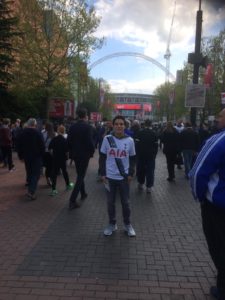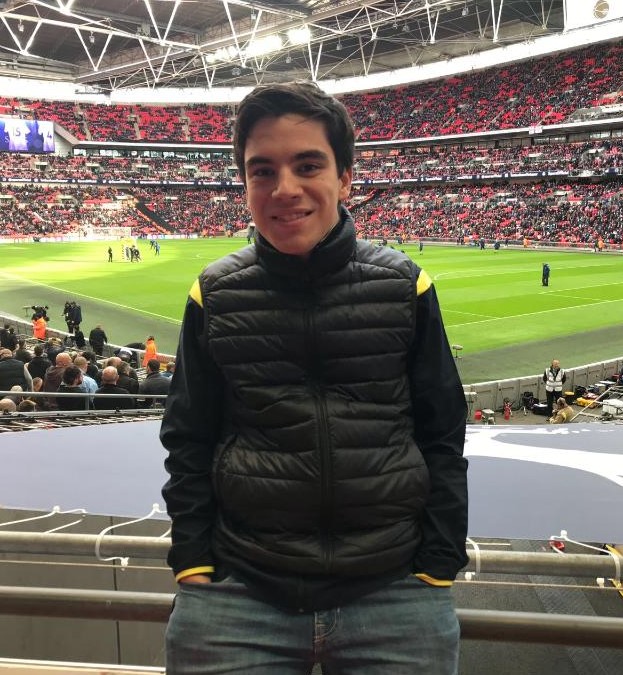Sometimes, people have a disability or a challenge that no one knows much about. Individuals may seem completely normal, but the day-to-day activities some find easy, suddenly become a lot harder.
Meet Finley Chung, an ordinary 20-year-old man who has a condition most people have probably never heard of.
It’s called Nystagmus and falls under the banner of visual impairment.
Nystagmus is a condition where an individual suffers from uncontrollable eye movements. It can often make it look like the individual’s eyes are shaking, either moving; side to side, up and down, or in a circular motion.
The condition is caused by an issue with a part of the eye that communicates visual signals to the brain to be processed, before providing the final image that we see, as Chung explains.
“It effects the messages going from my brain to my eyes,” he confirmed.
“I think the best way to describe to people is that I have to sit in a certain way or tilt my head in a certain way. When I’m watching Football for example, if the TV is 10 or 15 yards from the sofa, I can’t see the scoreboard in the top corner. I have to sit on a mat in front of the TV.
“Another example of how it affects me is that I can’t read the number plate of the car on the other side of the road from my house. That’s probably the best way I can describe the condition to people.”
Nystagmus itself is a rare condition, affecting at least one in 1,000 people of the general population. However, it is also the most common form of visual impairment among school aged children, but Chung himself has never met anyone else who has the condition.
“It’s so rare – I’ve never met or known anybody else that has had it or indeed heard of it,” admitted Chung. “It’s very, very loosely covered. There’s been no features of it on news websites, which makes it harder for people to understand and for me to explain.”
Different Is Good
Nystagmus makes it incredibly hard for individuals to read writing on a standard A4 bit of paper. Chung faced daily challenges especially at school, but also admits that he didn’t want any special treatment.
“Weirdly, it used to have more of an impact on me in education and in school,” he said. “I’d always have to have my worksheets blown up to A3 size, so I could actually see it. But the older I got, the more I realised that I don’t want to be different – I didn’t want any special treatment. I always just wanted to have a normal sheet and a normal book, like normal people do.
“It always made me feel different, although no one would ever bat an eye-lid, and everyone did what the teachers asked them to do for me. No one would change the way they were around me, but it just made me feel different.
“It’s something that’s never made me feel sad – it’s just something that’s made me feel different, but different is good I guess, right?”
Despite the challenges, Chung did very well both in his GCSE’s and A-Levels and is now in his third and final year of University, where he is studying Sports Journalism.
However, this didn’t come easy for Chung because the condition often provokes headaches, especially if they have to concentrate for long periods of time. He explains the slight differences between his exams and the ones every other student did.
“In exams, I got to do it in a different room to everyone else; I had an enlarged exam paper and I had 25 minutes extra time if I wanted it, because concentrating for a long period of time can give me really, really bad headaches,” confirmed Chung.
Always Some Positives
Being a big Football fan, Chung reminisced about playing Football growing up and also outlined one positive of the condition when playing.
“I used to really enjoy playing Football,” he beamed. “I would always give one hundred per cent, so I would get played in whatever position I was needed.
“I was never going to be the most technical player because whenever I got the ball, due to my condition, I would always need to get the ball completely under control first – I couldn’t not take a touch and spray the ball out wide 30 yards like some people can.
“I couldn’t head the ball either because I’d mis-judge it when it came flying out of the air or whatever. Due to the condition, my co-ordination was always a bit off, which would affect my close control – but I could still go into tackles!
“It also meant I never had to play in goal, so there’s always some positives!”
What It’s Like Watching Football
Playing Football for Chung may not be a completely different experience compared to others but watching Football on the other hand can prove to be tricky. He explains the reasons why, using Tottenham Hotspur as an example.
“Watching Football for me is different compared to other people,” admitted Chung. “It’s something that other people don’t really even acknowledge, they ask about it and I tell them a bit, but then they just let me get on with it.
“Where my season ticket was at Spurs before we moved (seats we still haven’t seen yet!), we sat right at the back of the North upper stand. Obviously, that’s really high up.
“When we were kicking towards the goal in front of the South stand – the other end where I sat – I sometimes had trouble seeing, especially if the ball was white and the crowd were also wearing white. This wasn’t helped when the ball was in and around the opposition box.
“It was always better in the Winter months, when they play with the Yellow ball, because I can see them a lot better. But often, I can’t see the ball when it goes into the final third of the opposite end of the ground. It affected me quite a lot of the time when I was younger – I had to go off crowd reaction because I couldn’t see.
“Despite this though, I still prefer sitting in the upper tier because you can see more of the game as a whole.”

People Can’t See What I See
Chung has never expressed to people how his condition has affected him before, but quite equally he’s always felt comfortable in being able to deal with the challenges he’s faced.
“I never used to tell people that it did affect me – mainly because they can’t see what I see. People just let me get on with it because I’ve always had my own ways of doing things or dealing with them. It’s something I’ve never really spoken about myself and it’s never really something I’ve had to say to people either – ‘you doing that affects me’ in these sorts of ways.
“There’s actually quite a lot of people that don’t know about my condition.”
Despite this, Chung has never let his visual impairment get in the way of his dreams or the aspirations he has in life. He dreams of becoming a sports journalist and working within Football club media.




